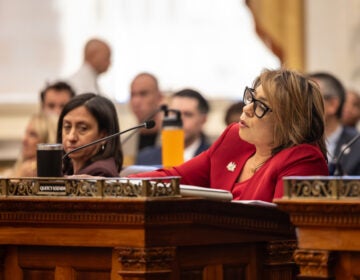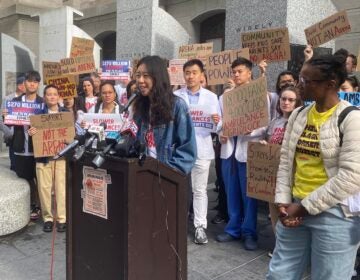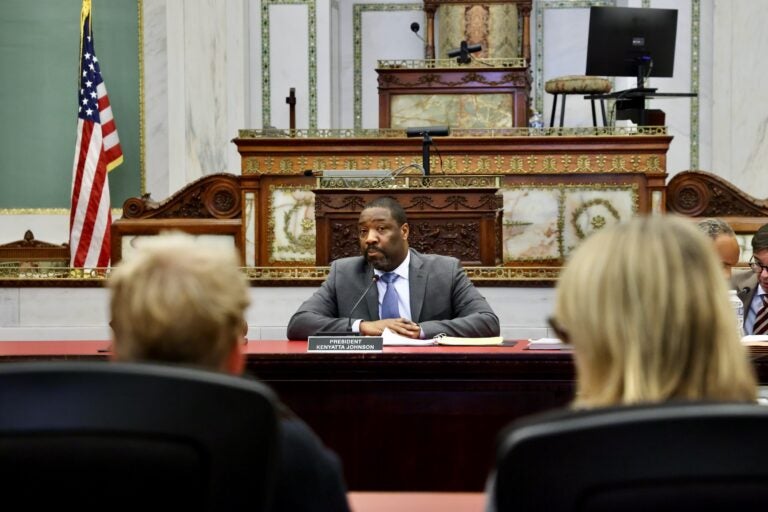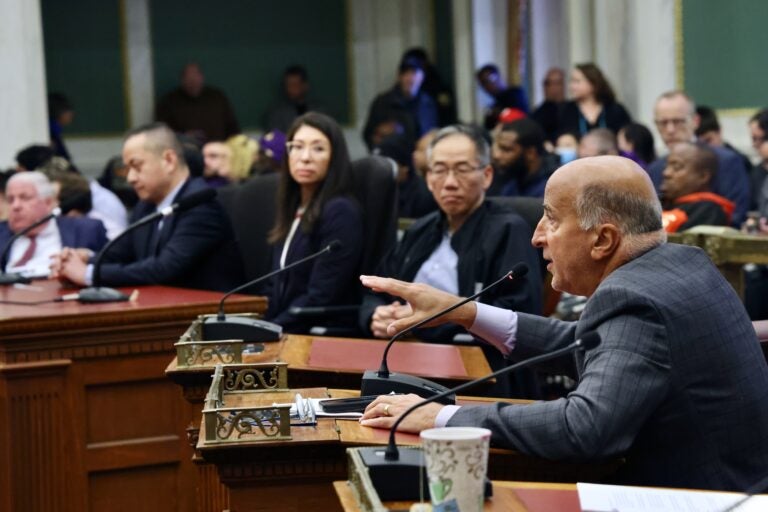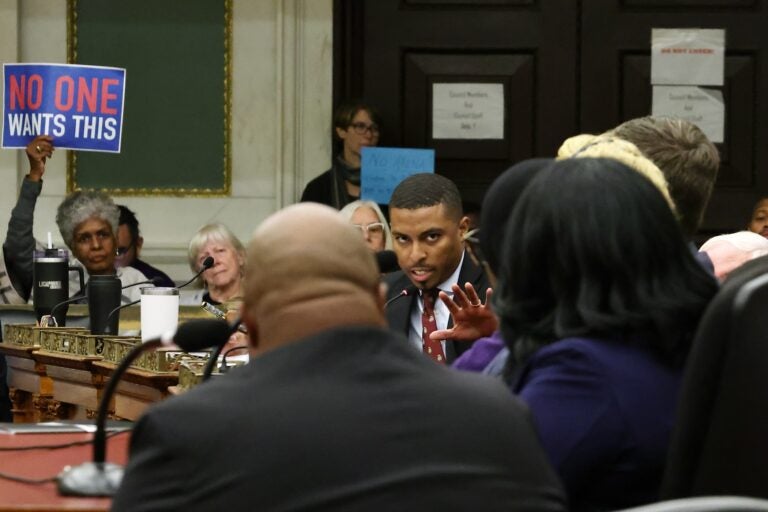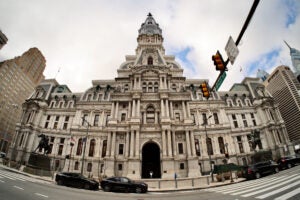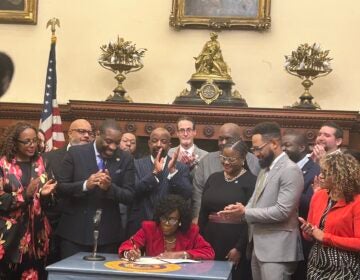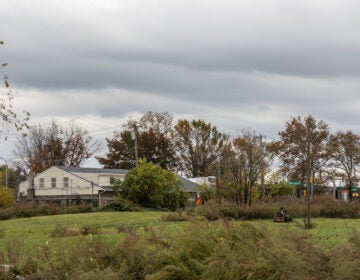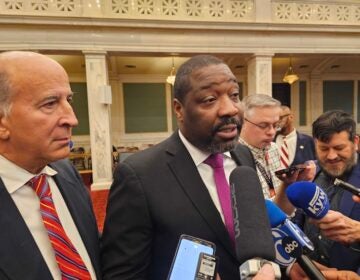Show me the money: SEPTA tells City Council it needs millions to expand service for arena goers
The authority is in dire straits as the Sixers seek to build the transit-oriented development. It’s unclear where the additional funding will come from.
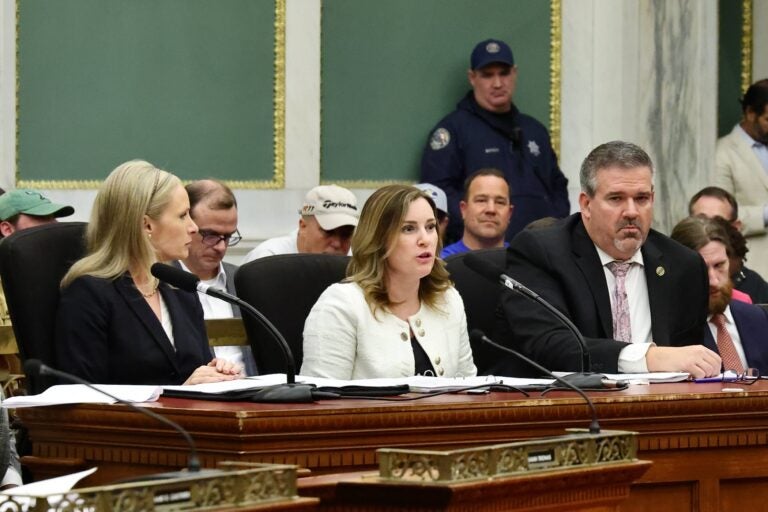
Representatives of SEPTA (from left) Deputy General Counsel Gretchen Wisehart, Chief of Staff Liz Smith and Interim General Manager Scott Sauer testify during a public hearing on the proposed 76ers arena above the agency's busiest transit hub Tuesday, Nov. 19, 2024. (Emma Lee/WHYY)
What you need to know
- The 76ers have proposed moving to a new $1.55 billion arena near Chinatown called “76 Place”
- The proposal has drawn swift condemnation, excitement, skepticism — and plenty of buzz
- Black Clergy of Philadelphia has endorsed the project, while a majority of Chinatown businesses and other community members have voiced their opposition
- Philly Mayor Cherelle Parker formally announced her support for the arena and unveiled a community benefits agreement
Have a question about Philly’s neighborhoods or the systems that shape them? PlanPhilly reporters want to hear from you! Ask us a question or send us a story idea you think we should cover.
SEPTA officials said Tuesday the cash-strapped authority cannot afford to expand service at Jefferson Station to better accommodate Sixers fans who choose to take the train home from games — if City Council authorizes the team to build a $1.3 billion arena directly above the busy stop.
“The reality is that SEPTA simply cannot assume these new costs within the framework of its operating budget,” said Scott Sauer, SEPTA’s interim general manager, during a daylong hearing devoted to the development.
Sauer’s testimony came roughly a week after SEPTA announced plans to raise fare prices and make severe service cuts in the face of a fiscal crisis borne by the end of federal pandemic relief aid. The authority is also in the midst of negotiating a pair of contracts, including with its largest bargaining unit, which is demanding higher wages, among other proposals.
Liz Smith, SEPTA’s chief of staff, told lawmakers that running additional trains on its Regional Rail lines would cost an estimated $21 million a year if the arena opened. The figure was calculated by Econsult Solutions, which also determined demolition and construction could cost SEPTA $32 million over six years.
The authority is facing an operating budget deficit of $153 million this fiscal year, and projects a $240 million shortfall for every fiscal year afterward.
“The cost of these impacts cannot be borne by SEPTA,” Smith said.
SEPTA’s math could hurt the Sixers’ goal of having a transit-oriented development where only 40% of fans drive to the arena. According to an impact study commissioned by the city, there would be “gridlock at critical intersections” if more than 40% of people drive to the arena.
At the moment, SEPTA trains generally run every one to two hours between 9 p.m and 11 p.m. Many Sixers games start at 7 p.m. or 8 p.m. and last around two hours.
“That is not a frequency of service that will get people out of their cars and onto transit. We believe we need to provide service at least every 30 minutes,” said Smith.
The new funding would cover 20 additional trains every evening, five additional buses on existing bus routes and extra manpower at Jefferson Station, she said.
SEPTA has started discussing the funding issue with the Sixers, which has quickly emerged as one of the major sticking points of the team’s proposal. Councilmember Cindy Bass chided team officials last week for not having these details worked out while asking Council to vote on the project before the end of the year.
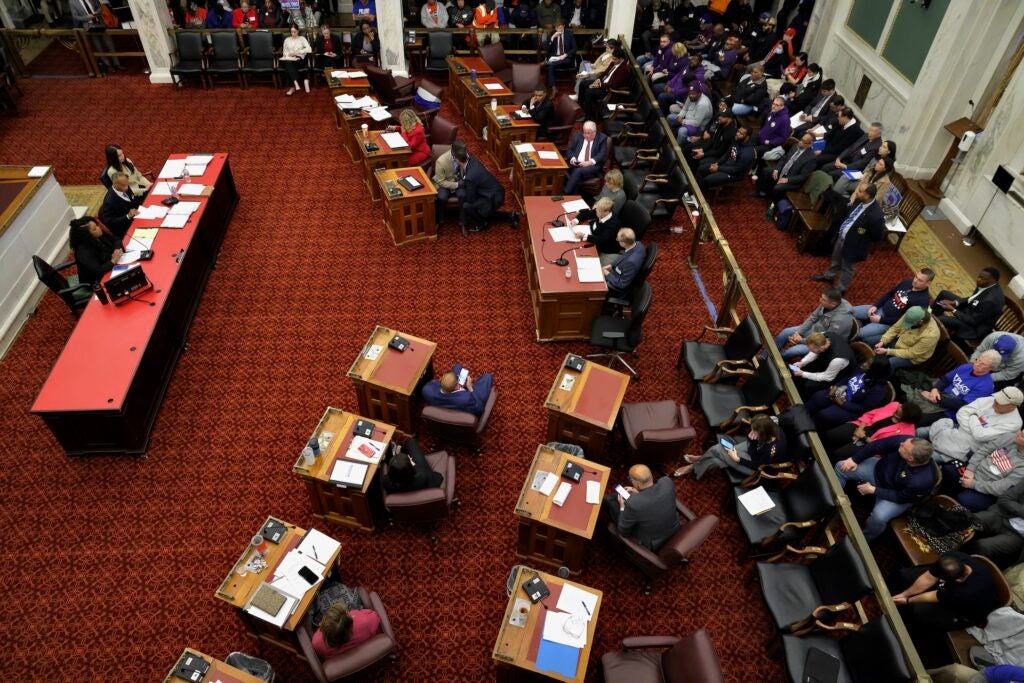
The Sixers have pushed back on the authority’s figures and told lawmakers that it has no plans to subsidize SEPTA operating costs. It has agreed to cover costs related to any physical impacts of building an 18,500-seat arena on top of Jefferson Station.
Members of the Mayor Cherelle Parker’s administration, which supports the arena, said last week that the city has no intention of increasing funding to SEPTA.
If SEPTA is unable to find additional funding, Smith said the authority would have to make more service cuts in order to expand its Regional Rail service at Jefferson Station. She said SEPTA does not see a need to expand service on its two subway lines.
“We have enough service and we have enough cars to accommodate those patrons,” said Smith.
Not in my backyard
Tuesday’s hearing, the third in a series of public hearings on the project, also featured testimony from opponents and proponents of the controversial development, including representatives from the city’s building trades and business owners in nearby Chinatown.
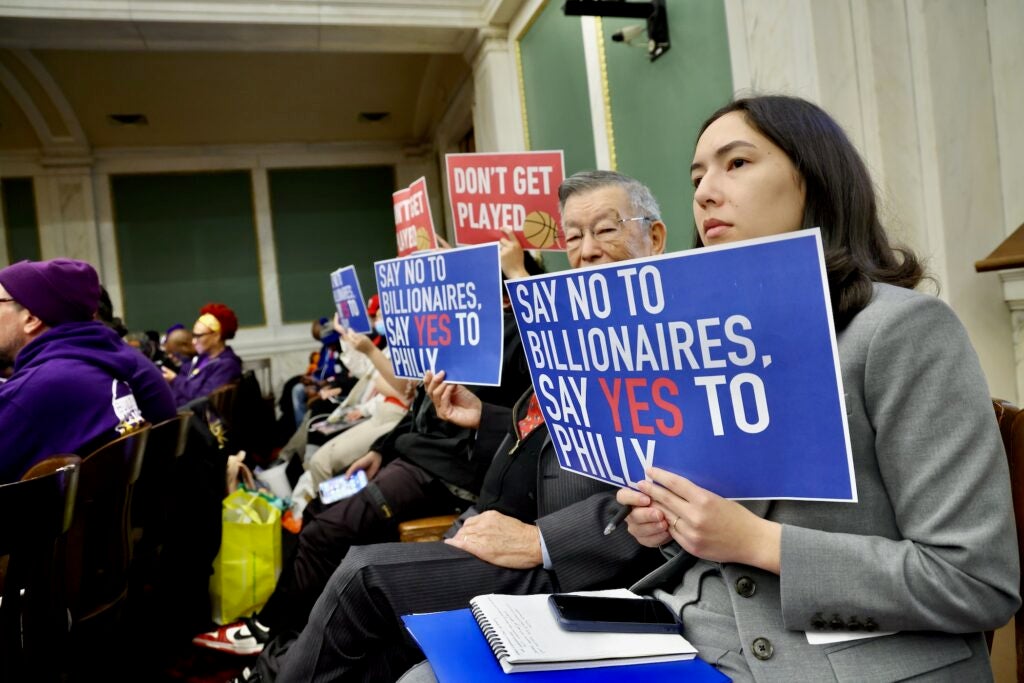
Several opponents of the arena told lawmakers that the development poses an existential threat to Chinatown, a 150-year-old neighborhood still recovering from the pandemic. They said the arena will cause the kind of traffic congestion that will deter people from patronizing small businesses that rely on non-residents to survive, killing an essential component of the community’s ecosystem.
They also said arena goers will not eat at Chinatown restaurants before or after the games and events.
“When you come to game night, you’re not thinking about authentic food. You’re thinking about cheesesteaks, you’re thinking about hot dogs, you’re thinking about beer and pizza,” said Michael Ha, who owns the QT Vietnamese Sandwich shop.
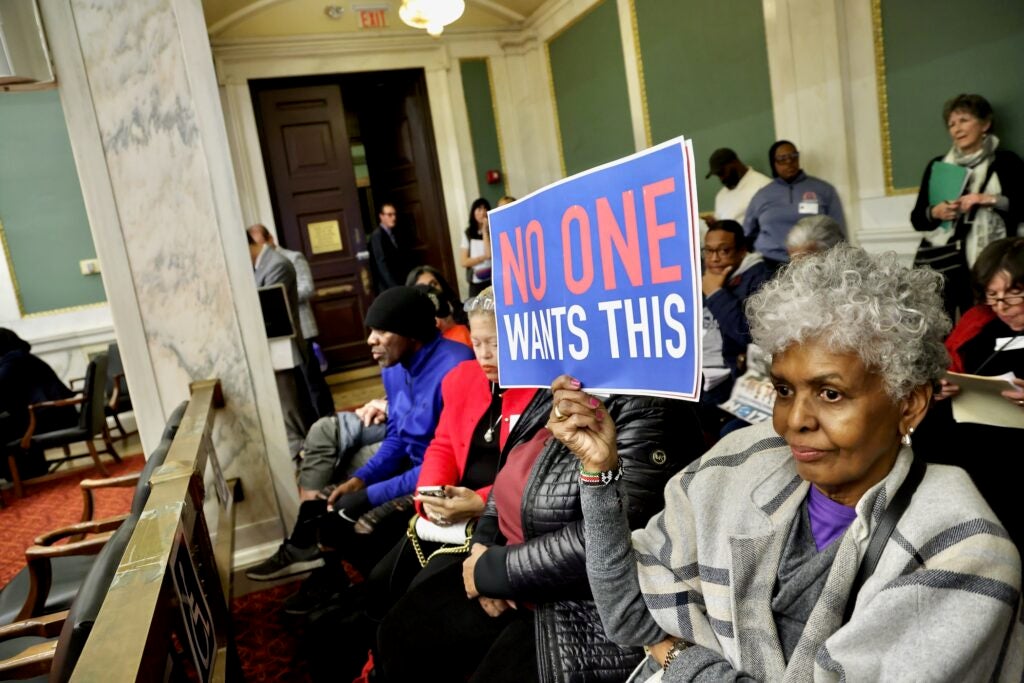
John Chin, executive director of the Philadelphia Chinatown Development Corporation, an influential organization in the city’s Chinese community, told council members that neither the enabling legislation before Council nor the city’s broader deal with the Sixers contained nearly enough protections for the neighborhood.
To preserve Chinatown, he said, the neighborhood needs a combination of strong cultural and economic development programs.
“I see none of that,” Chin said. “It’s barely a mitigation plan.”
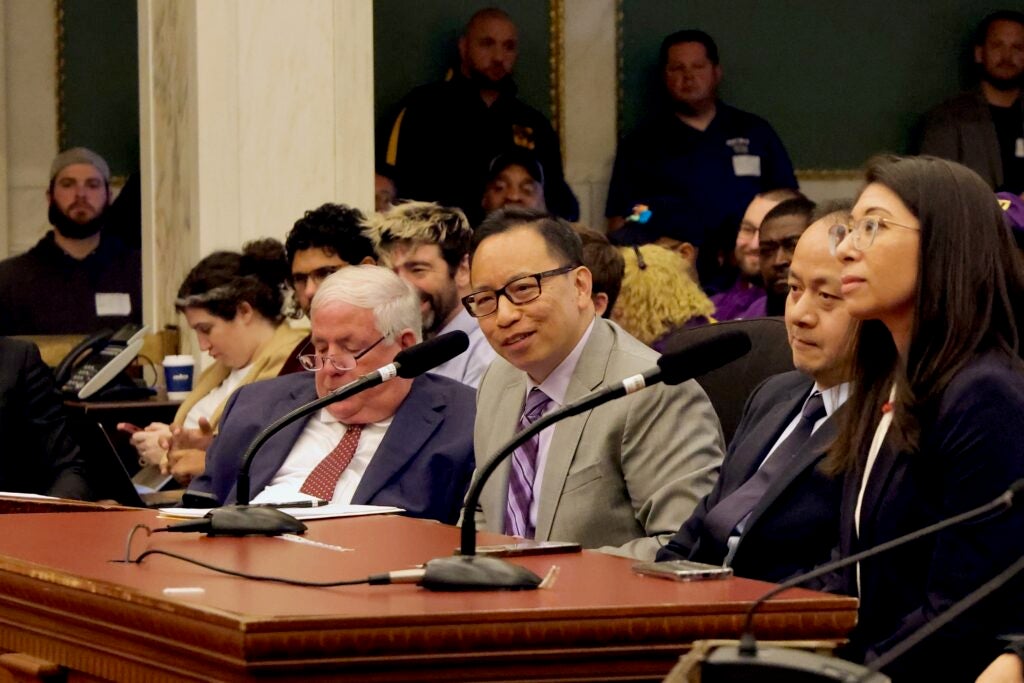
Opposition to the arena extends beyond Chinatown and includes residents and business owners in Washington Square West, a neighborhood that runs roughly from Market Street to South Street and from 7th Street to Broad Street.
Members of the neighborhood’s civic association, the oldest in Center City, also shared concerns about the impact of increased traffic while raising fears about how some of its residents and customers may be treated by fans.
Washington Square West is home to the city’s Gayborhood, a community that draws LGBTQ+ people from Philadelphia and around the world.
“We are asking the city to implement measures that will safeguard LGBTQ+ residents and visitors from harassment, discrimination and homophobic behavior,” said Tami Sortman, president of the Washington Square West Civic Association.
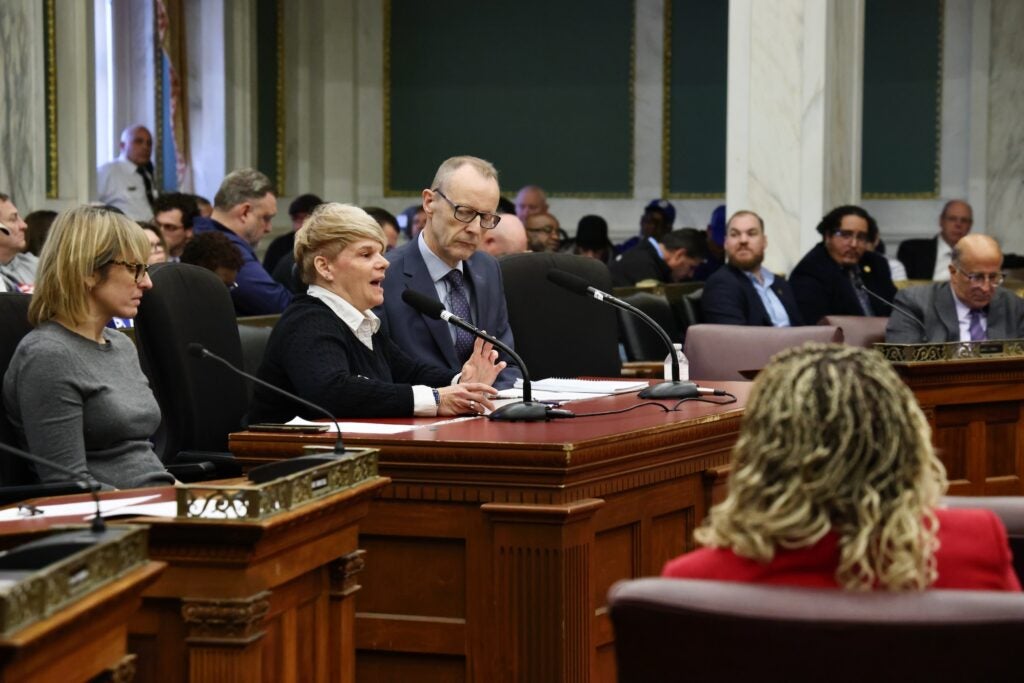
Arena backers had a different concern: that Philadelphia might pass up a generational opportunity to improve the city.
A panel of union officials said Tuesday that the arena will not only create hundreds of jobs but help revitalize Market East, a disjointed stretch of retail, government buildings and tourist attractions that has struggled to thrive for decades. They said the project will help change those fortunes by increasing the appetite for new development in the area.
“We can’t be NIMBYs — not in my backyard people. You don’t get growth that way. You get growth by being bold. And the future always benefits those that are bold,” said Ryan Boyer, business manager for the Philadelphia Building and Construction Trades Council, an umbrella group representing about 30,000 workers.
Boyer said rejecting the Sixers’ arena proposal would be a “black eye” for Philadelphia that would send a message that the city is not “open for business.”
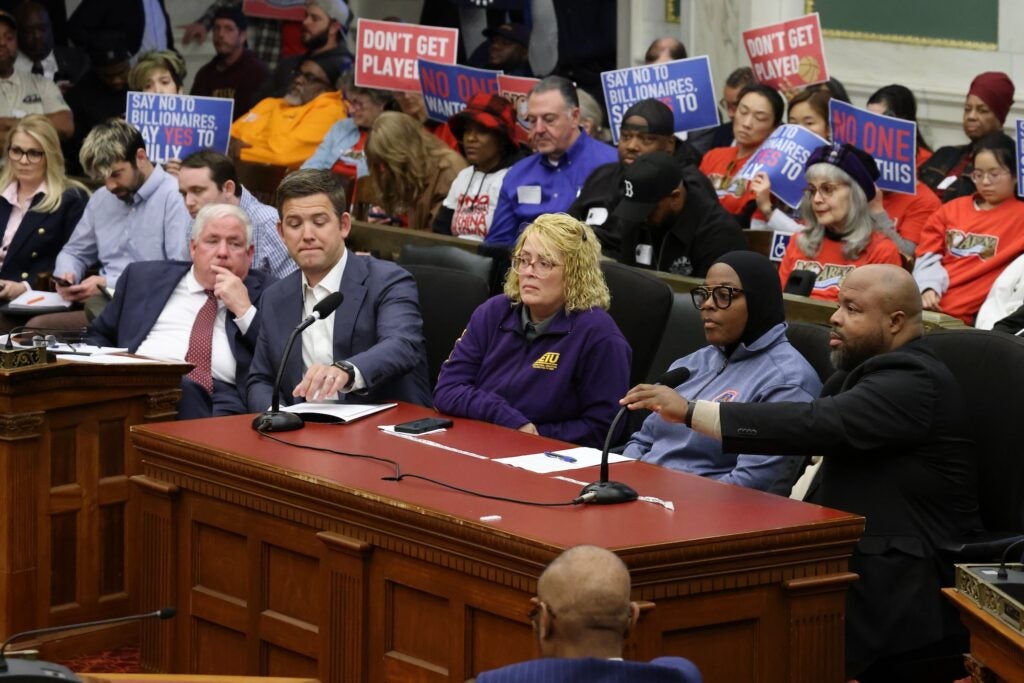
Layla Bibi, council representative for the Eastern Atlantic States Regional Council of Carpenters, which is not part of Boyer’s group, told lawmakers that the arena would enable people to complete their apprenticeships on one project, an exceedingly rare opportunity.
She said her union always wants to open its doors to new members, it just needs enough work in the pipeline to sustain working class families. The arena would help in that regard, she said.
“What we’re lacking is the opportunity,” Bibi said.
The hearings are scheduled to wrap up Dec. 3. Council will then vote on a legislative package containing the approvals the team needs to start construction.
The Sixers have said they need the authorization before the end of the year for the arena to open in 2031, the year its lease ends at the Wells Fargo Center in South Philadelphia.
Council’s final regular meeting is scheduled for Dec. 12.
 This story is a part of Every Voice, Every Vote, a collaborative project managed by The Lenfest Institute for Journalism. The William Penn Foundation provides lead support for Every Voice, Every Vote in 2024 and 2025 with additional funding from The Lenfest Institute for Journalism, Comcast NBC Universal, The John S. and James L. Knight Foundation, Henry L. Kimelman Family Foundation, Judy and Peter Leone, Arctos Foundation, Wyncote Foundation, 25th Century Foundation, and Dolfinger-McMahon Foundation.
This story is a part of Every Voice, Every Vote, a collaborative project managed by The Lenfest Institute for Journalism. The William Penn Foundation provides lead support for Every Voice, Every Vote in 2024 and 2025 with additional funding from The Lenfest Institute for Journalism, Comcast NBC Universal, The John S. and James L. Knight Foundation, Henry L. Kimelman Family Foundation, Judy and Peter Leone, Arctos Foundation, Wyncote Foundation, 25th Century Foundation, and Dolfinger-McMahon Foundation.
To learn more about the project and view a full list of supporters, visit www.everyvoice-everyvote.org. Editorial content is created independently of the project’s donors.

Subscribe to PlanPhilly
WHYY is your source for fact-based, in-depth journalism and information. As a nonprofit organization, we rely on financial support from readers like you. Please give today.




